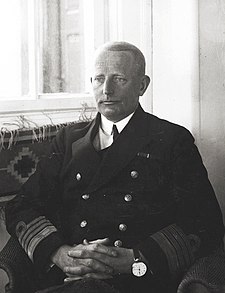Józef Unrug
| Vice Admiral Józef Unrug |
|
|---|---|
 |
|
| Born |
7 October 1884 Brandenburg an der Havel, Germany |
| Died | 28 February 1973 Lailly-en-Val, France |
| Allegiance |
|
| Service/branch |
|
| Years of service | from 1907 |
| Rank | Vice Admiral (Wiceadmirał) |
| Commands held |
SM UB-25, SM UC-11 and SM UC-28 C-i-C of the Polish Navy |
| Battles/wars | World War I, Polish-Soviet War, Invasion of Poland (1939) |
| Awards |
|
Józef Unrug (German: Joseph von Unruh; 6 October 1884 – 28 February 1973) was a Prussian-born Pole and Polish vice admiral who helped reestablish Poland's navy after World War I. During the opening stages of World War II, he served as the Polish Navy's commander-in-chief.
Józef Michał Hubert Unrug was born in Brandenburg an der Havel into a Polish family, of German descent, son of Tadeusz Unrug, a Generalmajor in the Prussian Army. After graduating from the gymnasium in Dresden, Unrug completed Naval college in 1907 and began his service in the German Navy. During World War I he commanded a U-boat, and was promoted to command a submarine flotilla.
In 1919, after Poland regained independence, Unrug left Germany and volunteered for the Polish Army. Soon afterwards he was transferred to the nascent Polish Navy, where he served as chief of the Hydrographic Division and then as commanding officer of a submarine flotilla. One of the most skilled officers in the Polish Navy, Unrug was quickly promoted to Rear Admiral. Overcoming his limitations in the Polish language, in 1925 he became Admiral of the fleet of the Polish Navy.
During the 1939 invasion of Poland, Unrug executed his plan of strategically withdrawing the Polish Navy's major vessels to the United Kingdom ("Operation Peking"). At the same time, he got all Polish submersibles to lay naval mines in the Bay of Gdańsk ("Plan Worek"). Following that operation, these vessels either escaped to the United Kingdom or sought refuge in neutral countries.
...
Wikipedia
